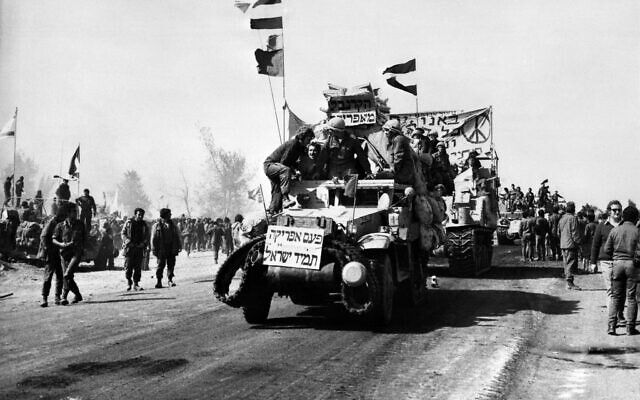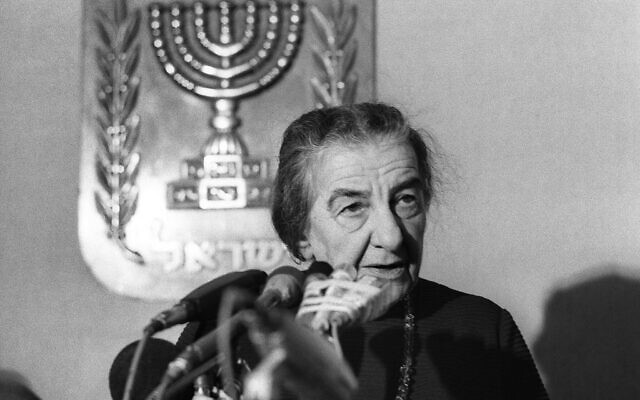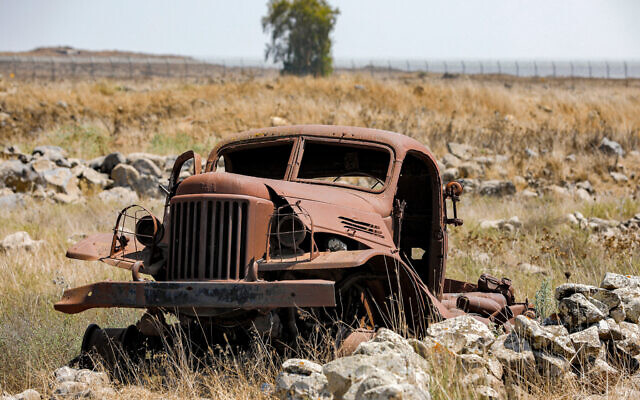AFP — A decorated Israeli veteran of tank battles on the Syrian front in the 1973 Arab-Israeli war, Avigdor Kahalani remembers the conflict, despite its heavy toll, as a “slap in the face” Israel badly needed.
The twin attack by Egypt and Syria on October 6 caught Israel by surprise on the holiest day of the Jewish calendar — Yom Kippur, the Day of Atonement — when the nation comes to a virtual standstill.
When the fighting erupted, Kahalani was a 29-year-old lieutenant colonel commanding the 77th tank battalion in the Golan Heights that overlook Syria.
He had only just returned to active duty after spending a year in hospital for follow-up treatment of severe burns he had suffered in the 1967 Arab-Israeli conflict.
That war had seen Israel conquer the Golan Heights, Sinai, West Bank and East Jerusalem, humiliating its foes and dramatically redrawing the regional map — but also creating what was later deemed a dangerous sense of complacency.
Get The Times of Israel's Daily Edition by email and never miss our top stories
As soon as the new war broke out on two fronts, Kahalani knew that Israeli forces were badly outnumbered, the 79-year-old recalled in an interview with AFP at his home in Tel Aviv.

Israelis forces withdraw from positions west of the Suez Canal on March 1, 1974, after a disengagement agreement between Egypt and Israel at kilometer marker 101. (Photo by AFP)
Syria had eight to 10 times more tanks than Israel and “their tanks were better than ours,” he said.
“All of a sudden we understood that it’s a total war, we’re losing territory,” he recalled, adding that within 24 hours the Syrian forces “had conquered almost all of the Golan Heights.”
“There were moments when someone looking from the outside would have said: ‘You have no chance’,” he recalled.
“But we won,” he added with a wry smile.
‘Critical moment’
Within three days, the Israeli forces seemed on the verge of defeat, with Syrian forces directly threatening Israel’s core territory.
But, in a dramatic turn of events on the battlefield, Kahalani’s unit and battalions of the 7th Armoured Brigade were able to halt the Syrian momentum.

(FILES) Prime Minister Golda Meir gives a speech on November 10, 1973 during an extraordinary Council of Ministers in Tel Aviv about the possible signature of an accord with Egypt after the 1973 Arab Israeli War. (Photo by AFP)
“I had to lead the attack to reconquer the hills from where we could stop them,” the former tank commander said. “And then came, on this line, around 160 tanks, and we were only 10 or 12 that had to stop them.”
After days of fierce fighting, the Syrians retreated. Kahalani said he had personally disabled 45 of the 150 enemy tanks his unit had taken out.
“That was a critical moment, when you’ve strained every muscle in your body, after four days of combat with nearly no food, without sleep, with just a few ammunition rounds left in your tank.
“You utilize every muscle, every thought, to be better than them, to win,” said Kahalani, who is celebrated as a living legend in Israel and regularly speaks with young conscripts.
In 1975, Kahalani received the Medal of Valour, Israel’s highest military distinction. The citation honored his “wondrous leadership and personal heroism in a difficult and complicated battle, whose outcome changed the course of the Golan Heights campaign.”

This picture taken on September 6, 2023 shows a view of a rusty old truck that was carrying artillery and mortar shells from the 1973 Arab-Israeli War at a position near the Syrian border in the Israel-annexed Golan Heights. (Photo by JALAA MAREY / AFP)
‘No sacred cows’
After the initial floundering, Israel, mobilizing all reserve units and supported by a US airlift, was able to redress the battlefield situation.
Israeli forces counter-attacked Egypt and crossed the Suez Canal, while in the north its soldiers retook the Golan. Fighting ended with a UN-validated ceasefire on October 25.
Both sides suffered heavy losses in the three weeks of fighting. More than 2,600 Israeli soldiers were killed and more than 9,500 Arab troops were dead and missing.
Many historians argue that Israel’s 1967 victory had instilled a sense of invulnerability among its political and military leadership.
So, despite the heavy losses, Kahalani, who lost a brother in the conflict, argues the 1973 war was a necessary wake-up call.
Its effect was like “a very strong slap in the face,” he said, arguing that it “brought our sanity back to a certain extent.”

An Israeli flag hangs on the rusty remains of an Israeli battle tank at a memorial from the 1973 Arab-Israeli War on Tel Saki, a hill near the Syrian border in the Israel-annexed Golan Heights, on April 25, 2023. (Photo by JALAA MAREY / AFP)
“Had the reservists been mobilized two days earlier, it’s likely that the war could have been avoided,” he said.
But members of then-prime minister Golda Meir’s government were “hesitant,” Kahalani noted, “even when they had all the indications that there was about to be a war.”
The shock of Israel’s unpreparedness changed everything, he said of the deep soul-searching and high-profile resignations that followed.
“There were no more sacred cows.”
‘Moment of truth’
A year after the war, a commission was set up to investigate Israel’s level of military preparedness and its reaction to the outbreak of the war.
The army’s top commander David Elazar and the head of military intelligence Eli Zeira resigned. Meir, while not directly implicated by the commission, stepped down as prime minister in 1974.
The war had enormous global repercussions. Arab oil producers doubled and then redoubled the price of their crude in a huge shock to the world economy, and Egypt would make peace with Israel in 1979, regaining the Sinai.

(FILES) Israeli Chief of Staff David Elazar (2nd R) and later Israeli Premier Yitzhak Rabin (L) land near frontline positions on the Golan Heights during the 1973 Arab-Israeli War on October 9, 1973. On October 6, 1973, (Photo by EITAN HARIS / GPO / AFP)
Kahalani stayed in the army, reaching the rank of brigadier general, before resigning and joining the Labour Party in 1992.
He later left to form a centrist party and served as public security minister in Benjamin Netanyahu’s first government from 1996-1999.
To Kahalani, the 1973 war was the trigger that pushed Israel to develop more sophisticated weapons, such as the Iron Dome missile defense system, and to achieve the military technological edge it enjoys today.
But above all, the conflict served as a timely warning of Israel’s “existential problem,” which Kahalani argues is now embodied by arch-enemy Iran.
Israel charges that Iran, whose leaders have called repeatedly for its destruction, is seeking to acquire nuclear weapons, a goal Tehran denies.
“The moment of truth will come, I have no illusions,” Kahalani said of a potential showdown with Iran.
When that day comes, he said, he hopes that “Israel will have courageous leadership.”


